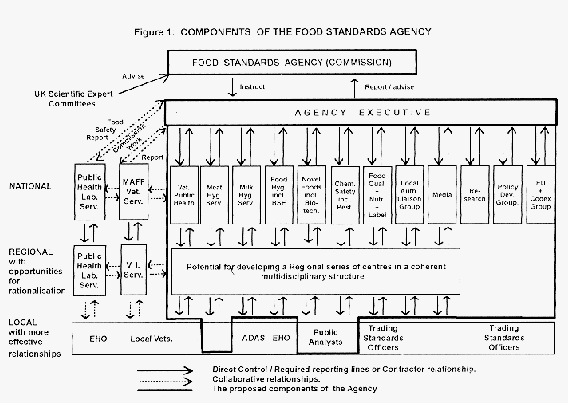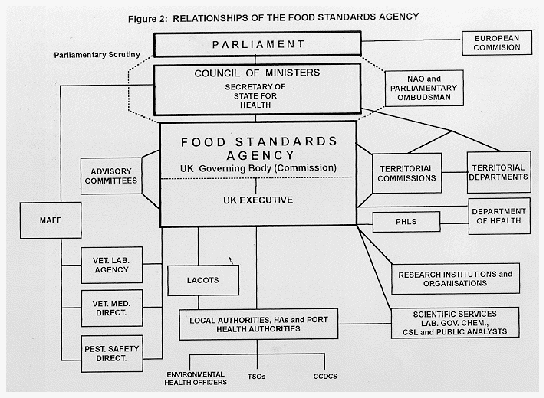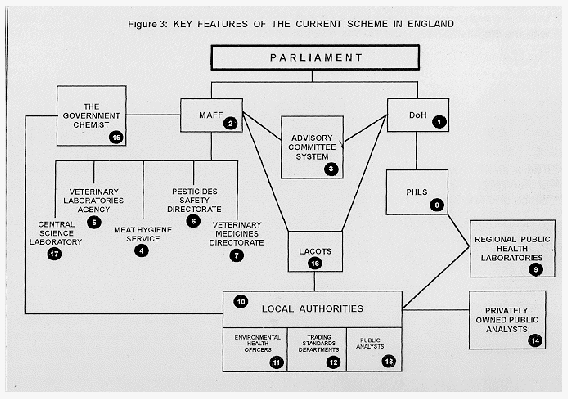Department of Food and Nutritional Biosciences
The University of Reading, UK
Food Law
Proposed UK Food Standards Agency
Early Work by Government
To go to main Food Law Index page, click here.
Prior to the 1997 General Election in the UK, the Labour Party had proposed that a new structure should be developed for the control of food safety and the title “Food Standards Agency “ has been used for this concept. On the 7th March 1997, the Labour Party asked Professor Philip James to propose the structure and function of a Food Standards Agency. His interim proposals were completed on the 30th April 1997 and were presented to the new Prime Minister on the 8th May. The full report is available on the MAFF Web pages - James Report.
The following are provided on this page:
EXTRACT FROM QUEEN'S SPEECH
House of Lords, 14 May 1997
"My Government will contribute to the achievement of high standards of food safety and protection of public health throughout the food chain, will ensure openness and transparency of information to consumers, and will consult widely on recommendations for a Food Standards Agency."
PRESS NOTICE - 10 DOWNING STREET
8 MAY 1997
The Prime Minister, the Rt Hon Tony Blair MP, today welcomed the publication of Professor Philip James' Report into the estblishment of an independant Food Standards Agency.
Welcoming the publication of the Report the Prime Minister said:
The public has the right to expect the very highest standards of food safety. Confidence in the safety of the food we eat has been severely undermined in recent years and I am determined to rebuild that trust.
I thank Professor James for his details and considered report. It provides an excellent foundation upon which the Government can build. It confirms my belief that we will benefit from a powerful Food Standards Agency. We need to create a structure that is open and transparent, and which acts - and is seen to act - in the interests of consumers.
I shall be establishing a new Ministerial Group on Food Safety under the chairmanship of David Clark to take forward these proposals. This will include Ministers from the Ministry of Agriculture, Fisheries and Food, the Department of Health, the Cabinet Office, the Scottish Office, the Welsh Office and the Northern Ireland Office. The Cabinet Office will be consulting widely in the weeks to come.
In the interim Dr Jack Cunningham, the Minister for Agriculture has already acted to ensure greater openness in the working practices of MAFF and more responsiveness to the needs of the public.
The report recommends theat the new Food Standards Agency should be a non-Departmental public body with executive powers and a structure that is based loosely on the proven effectiveness and resultant public trust in the Health and Safety Executive.
FOOD STANDARDS AGENCY
An Interim Proposal by Professor Philip James
30 April 1997
EXECUTIVE SUMMARY
- The request on March 7th 1997 to propose the function and structure of a Food Standards Agency (FSA) led to an analysis of the basis of current problems, an assessment of overseas initiatives and UK proposals, and to widespread consultation throughout the UK. This report should be viewed as an interim consultative document which highlights the remit and the processes needed for establishing the Agency with the required urgency. One fundamental aim should be to re-establish within 3 years public confidence in the national mechanisms for handling problems concerning food. To have a major impact on food-borne infections and other aspects of food safety will take longer. The formation of the Agency will provide an opportunity for the UK to propose new arrangements for handling food issues in the European Union.
- Many national surveys reveal that the public has lost confidence in the safety of British food. Secrecy characterises decision-making and inappropriate political and industrial interests are perceived to determine decisions on food safety to the detriment of public health and consumer interests. This conflict of public and vested interests in Whitehall is amplified by the apparent lack of co-ordination between, for example, veterinarians and medical experts and the failure to overcome institutional barriers at many levels throughout the food chain. The fragmented nature of the system and its complex financial and regulatory management systems also limit rational preventive action. Experience abroad and in the UK demonstrates that consumer education and information do not reduce public anxiety and distrust unless there is also effective and clear structural change to improve food safety. The escalating rates of food-borne infection bear witness to the unsatisfactory state of current food safety measures.
- The new Agency should be established as a Non-Departmental Public Body (NDPB) with Executive Powers and with a structure which is based loosely on the proven effectiveness and public trust in the Health and Safety Commission/ Executive (HSC/E). The HSC/E approach needs developing further and an FSA should have more consumer and other public interest involvement within its structure, a different mechanism of reporting which is responsive to constitutional changes and a different role in Ministerial negotiations in the EU. It should also operate more directly in relation to Parliament.
- The Agency's funding should be the primary responsibility of Health Ministers. In principle, all funding for food safety and standards work should be channelled through the new Agency, even if local authorities and other bodies, such as the Public Health Laboratory Service (PHLS), conduct work in conjunction with or on behalf of the Agency.
- The Agency should report to Parliament through Health Ministers, with the Secretary of State for Health immediately taking the lead. Other Ministers, such as the Minister of Agriculture, however, will retain a substantial and legitimate interest in this policy area. A Ministerial Council could be considered an unorthodox but appropriate reporting mechanism for the established Agency with the Secretary of State for Health taking the lead.
- The Agency should have a remit to assure public health in all matters of national food policy including the microbiological, chemical and nutritional aspects of food, and novel food and processes, such as genetic modification. Its remit should also cover food standards and labelling. The role of the Agency will include developing policy, proposing and drafting legislation and responsibility for public education and information. It should have powers of access for auditing, surveillance and enforcement "from the plough to the plate". It should work closely with local authorities to produce a new cohesive organisation with a National, Regional and Local structure (Fig 1).

- The Agency should be responsible for food law enforcement. This should involve co-ordinating, monitoring, setting standards for and auditing of local authority food law enforcement activities. The Agency should also have enforcement powers and employ additional staff to assist local authorities if needed. The Agency should develop an effective regional presence to support local authorities in the surveillance and enforcement process.
- The Agency will need to take over all those aspects of MAFF activities which relate to food standards and safety including policy making, expert scientific assessment, technical negotiation with the EU, food research, public education and food surveillance. The analogous aspects of DoH activity, including those on public health and medical aspects of food policy, should also be incorporated into the Agency. A number of other bodies and agencies should be retained as presently constituted but should report to the new Agency for relevant parts of their work (Fig.2). It is assumed that, with the appointment of a new Minister of Public Health, the present reporting structure of the Department of Health (DoH) would change so that the Chief Medical Officer of Health (CMO) is automatically involved in all aspects of public health. The food role of the Health Education Authority (HEA) overlaps with the Agency's remit.

- The Agency should be structured with a Commission of about 10 members appointed by the Prime Minister or Ministerial Council. The Commission should include people with a background in industry, for their expertise and knowledge, but public and consumer interests should be in the majority. The Commission should include representatives of Scotland, Wales and Northern Ireland. The Chairman should initially be full time, with the other paid Commission Members working at least 3-4 days each month in the early phase of the Agency's development.
- The formation of the Agency's Executive and its effective functioning depend on having high quality administrative and scientific staff as well as a Chief Executive. The civil servants transferred from government departments would need to be employed by the Agency and acquire rapidly a culture where public health and consumer interests clearly dominate whilst proper account is taken of economic and business interests. Industries critically affected by consumer confidence in food produced and manufactured in the UK will benefit by operating in a more coherent and predictable climate.
- The different surveillance and enforcement structures in the constituent parts of the UK have been recognised and preliminary proposals developed so that the UK Agency can operate effectively throughout the UK whilst taking account of Territorial needs and sensitivities. Special territorial arrangements are proposed on the assumption that, in the event of devolution, food concerns will not be reserved as Westminster powers. The Commission would therefore advise the devolved Parliaments as it does Westminster. Separate Commissions, which feed into the UK Commission, should be created to advise on particular issues of Scottish, Welsh or Northern Irish significance.
- The Agency would have to be established by statute. Given the probably heavy legislative programme in the next Parliamentary session, the need for consultation and for further analysis it is unlikely that legislation could be introduced before 1998-99. It is therefore suggested that a Cabinet Committee be formed to take the proposals forward. As an interim measure, elements of the Agency, including the Commission, could be formed rapidly albeit in an advisory capacity. Great care is needed to ensure that food safety is not compromised by the transitional arrangements. The Chairman and the developing structures will need to command public confidence. To portray its focus effectively the Agency might best be called "The Food and Health Commission".
- The costs arising from current food related diseases are extremely high. The present proposals concern the reorganisation of a large number of public bodies into a more cohesive multidimensional structure. International experience suggests that the direct costs of introducing effective food safety measures are small.
THE CURRENT SYSTEM IN ENGLAND
The "James Report" (Part 1, Section 3) provides a useful summary of the present position on enforcment in England using the following figure.

The following notes refer to the various points numbered in the Figure above:
- 1. The Department of Health (DoH) takes a lead on issues of food hygiene, microbiological food safety and nutrition.
- 2. MAFF is the load department on food standards, chemical safety of food, food labelling and food technology. The territorial departments have responsibility for food safety and liaise closely with Westminster departments.
- 3. The five relevant departments are advised by a series of expert committees. These committees are made up of individual experts appointed for their expertise. Appendix 11 lists some of the principal committees advising MAFF and DoH on food safety.
- 4. The Meat Hygiene Service was created as an Executive agency of MAFF in April 1995 to provide a meat inspection service to licensed meat premises and enforce hygiene and welfare laws in slaughterhouses. Enforcement is carried out by teams of Meat Hygiene Inspectors and Official Veterinary Surgeons.
- 5. Creation of the Veterinary Laboratories Agency (VLA) merged the Central Veterinary Laboratory with the network of Veterinary Investigation Centres. The role of VLA is to provide MAFF with specialist veterinary advice based on sound investigation and surveillance, laboratory testing, research and development. This includes an important element concerned with food safety.
- 6. The Pesticides Safety Directorate (PSD) is responsible for evaluating and approving the use of pesticides and implementing post-approval controls. It is also responsible for advising Ministers on policy relating to pesticides.
- 7. The Veterinary Medicines Directorate (VMD) is responsible for evaluation and approval of veterinary medicines. It is also responsible for surveillance of suspected adverse reactions and monitors residues in meat and animal products.
- 8. Most of the surveillance of the microbiological safety of food is done in England and Wales by the Public Health Laboratory Service (PHLS) in partnership with local environmental health departments.
- 9. Regional Public Health Laboratories provide environmental health departments with microbiological testing.
- 10. Responsibility for enforcing the majority of food legislation lies with local authorities. In England and Wales this responsibility is divided between district and county councils. Where there are unitary authorities, these combine trading standards and environmental health into a single department. Port Health Authorities also enforce food hygiene legislation.
- 11. Environmental Health Departments, at district or unitary level, enforce legislation on food hygiene.
- 12. Trading standards departments - usually within County Councils - have responsibility for enforcing legislation on food standards and labelling of food. Food standards includes 'the quality, composition, labelling, presentation and advertising of food and of materials or articles in contact with food'.
- 13. Public analysts provide an analytical service for local authorities. Counties, Metropolitan and Unitary authorities must appoint at least one public analyst which they are required to use for all compositional sampling work under the Food Safety Act 1 990.
- 14. Many local authorities have appointed privately owned public analysts, who carry out other work as well.
- 15. The Laboratory of the Government Chemist (LGC) acts as a reference laboratory when there are disputes between local authorities and food companies.
- 16. Co-ordination of local authority enforcement on food issues is the responsibility of the Local Authority Coordinating Body on Food and Trading Standards (LACOTS) which provides advice and guidance for enforcement authorities and advises central government on enforcement issues. LACOTS acts as the UK Single Liaison Body for trans-border food problems in the EU.
- 17. Another of MAFF's agencies, the Central Science Laboratory (CSL), provides a wide range of scientific services and scientific support to policy work.
This page was first established by David Jukes on 22 June 1999.
Go to FS&T Departmental home page.